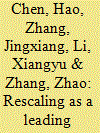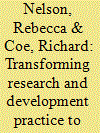|
|
|
Sort Order |
|
|
|
Items / Page
|
|
|
|
|
|
|
| Srl | Item |
| 1 |
ID:
132660


|
|
Analysis of monthly household energy consumption among single-f
/ Valenzuela, Carlos; Valencia, Alelhie; White, Steve; Jordan, Jeffrey A, Cano, Stephanie, Keating, Jerome, Nagorski, John, Potter, L.B
|

|
|
|
|
| Publication |
2014.
|
| Summary/Abstract |
Demographic, socioeconomic, and housing characteristics influence variation in household energy consumption. By combining household-level utility, public, and proprietary data, we examine predictors of household energy consumption in a Texas urban area. Using quantile regression, this analysis assesses the relationship between energy consumption and predictors at the middle and both ends of the distribution (10th and 90th percentiles). Results indicate potential opportunities to lower consumption among the highest energy-consuming households including those with pools, with non-central cooling, with people working from home, those built on pier/post foundation, and those that are renter-occupied. These findings suggest significant opportunities to reduce consumption and demand as in the study area, almost 10% of housing units are renter-occupied, 18% percent are without central cooling, and 7% have pools. Capturing a significant portion of these homes for retrofit conservation efforts through marketing has potential to produce substantial results. Producing a better understanding of determinants of household energy consumption using the methods presented has potential to assist development and implementation of strategies to reduce consumption and increase efficiency.
|
|
|
|
|
|
|
|
|
|
|
|
|
|
|
|
| 2 |
ID:
131644


|
|
|
|
|
| Publication |
2014.
|
| Summary/Abstract |
Mass incidents are inevitable in contemporary China and the first thing we should learn is to adopt a correct attitude towards them. Based on the three elements-activity, interaction and sentiment-of collective behaviors in 52 mass incidents in China during 2007-2011, we find that collective behaviors in mass incidents show significant differences in activity, interaction and sentiment. A grade evaluation method is proposed to estimate the evolution of collective behaviors in 52 mass incidents and to classify such behaviors into five grades. Then the influence factors on the three elements are analyzed using multiple linear regression. The regression results demonstrate that the impacts of location, casualties, inner-group relations, group scale and duration on the three elements are very significant. Finally, in the light of the regression results, some implications of collective behavior in mass incidents are proposed for the relevant authorities in responding to mass incidents.
|
|
|
|
|
|
|
|
|
|
|
|
|
|
|
|
| 3 |
ID:
132409


|
|
|
|
|
| Publication |
2014.
|
| Summary/Abstract |
Several East Asian countries, with scarcely any crude oil, have developed since the second half of the twentieth century strong production capacities in refining and petrochemicals. This has been the case in Japan, Taiwan, Singapore, South Korea, Malaysia, Thailand, Indonesia and China. This paper assesses whether the development of refining and petrochemical industries in these countries may be better understood with the aid of one of the major interpretative paradigms of structural change and foreign relations in East Asia: the Flying Geese Paradigm. The article concludes that, overall, the production and external relations in oil-related industries do indeed follow a Flying Geese Paradigm pattern. We observe, nevertheless, some dissonances that are attributable to the particularities of intermediate sectors (such as refining and basic petrochemistry).
|
|
|
|
|
|
|
|
|
|
|
|
|
|
|
|
| 4 |
ID:
129098


|
|
|
|
|
| Publication |
2014.
|
| Summary/Abstract |
it is worthwhile to empirically probe the prominent value of the transformation process by employing the state rescaling perspective. However, the stated rescaling, as an important theoretical discourses, that not been s_\ stoically scrutinized in Chinese context. In this article. the empirical lrainexxorlx based on the central state--led regional planning and its changes is established and implemented to unfold the solution
tra_iector} of China's six state scaling stages since 1953. In the mean- time. it is argued that China's state rescaling is not resulted from o\enroll socioeconomic tt'ansforination. hut plays a role as the leading project. theoretical . it could he concluded that state rescaling in China is neither the product of internal 'natural economic process' nor the consequence triggered have the globalization. hut the outcome or" the state's politic political selection.
|
|
|
|
|
|
|
|
|
|
|
|
|
|
|
|
| 5 |
ID:
130303


|
|
|
|
|
| Publication |
2014.
|
| Summary/Abstract |
Millions of smallholder farmers face the daunting challenge of sustaining or improving productivity in the face of rising input costs, limited access to input and output markets, climate vagaries, and depleted natural resources. These farmers' objectives and circumstance are diverse, varying with both their biophysical environments and their socioeconomic and cultural context. Agroecological intensification (AEI), or the integration of agroecological principles into farm and system management can improve the performance of agriculture-"performance" being locally defined and potentially including productivity, nutrition, resilience, and sustainability.
|
|
|
|
|
|
|
|
|
|
|
|
|
|
|
|
|
|
|
|
|